Australia’s Bushfires
The Wake-up Call Australia & the World Needed
Note: there is an about author section about the bottom of the page. Cover image: DFES.
It’s Scott Morrison’s fault. It only happened because the Greens didn’t allow reduction burns. It’s because we aren’t implementing Traditional burning regimes. The Government did nothing. The Rural Fire Service was underfunded. Where was the Australian Defence Force? Climate change; it’s because of climate change and coal.
As one of the worst fires in history continues to burn across south-east Australia, this is what Australians, and the rest of the world, have been seeing in their social media & news feeds. To date, the Australian bushfires have burnt more than six (with some reports claiming 10+) million hectares, six times the size of the devastating fires that swept the Amazon in 2019. It is estimated that millions of animals have perished, hundreds of homes have been destroyed and several lives have been tragically lost. Many people have been left to feel helpless and it’s in our nature, to need to blame someone or something. The Australian government has copped it. By pointing the finger, we can deny we are responsible. But we can also have something that we can aim to fix. Here, we delve into the nitty-gritty of the topic.
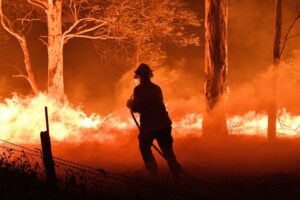
The Complex Nature of Australian Bushfires
Naturally, the Australian landscape is largely defined by fire. It has been part of our landscape for millennia, even before Aboriginals used it as a tool. We are lucky that many of our native plants have adapted to fire and many plant species even require it for germination. It has many benefits; germination, fuel reduction, encouraging plant growth and creating fertile ash. It can even create nesting hollows in logs and can prevent rainforest encroaching on (natural) savannah & eucalypt woodlands.
Fire is also an incredibly complex topic. Even scientists who research fire still don’t understand every aspect of it. CSIRO (https://www.csiro.au/en/Research/Environment/Extreme-Events/Bushfire/Bushfire-research), one of Australia’s leading research bodies has a good grasp on it, but are also still learning. Indigenous Australian Traditional Owners have an incredible grasp on the topic, but again, this knowledge is locally relevant and now must take into consideration more modern variables.
Fire varies from region to region. It is affected by weather conditions and, as we’ve now seen, can create its own weather. Modern civilisation (buildings, roads, dams, grazing, climate etc) has affected the nature of fire, making it even more complex to manage.
What we must understand about fire and fuel reduction burns is that fire is different in each region, and may not always provide the best outcome, or work at all. What works in one region might be completely irrelevant in another. A video came out earlier in the fire crisis from a Traditional Owner that had only just done reduction burns on his land a couple of months before. He goes on to say that reduction burns didn’t make a difference and that the fire came through the canopy so fast there was nothing they could do. So, while sometimes they may work, it isn’t a guarantee.
Traditional Burns
Firstly, let me say, Indigenous burning is brilliant, and it has it merits, but it’s also not perfect. Many Indigenous clans in Australia had (and still have) people that were knowledge holders of specific information: fire, animal species, water etc. In some cases, it is possible this knowledge of fire, specific to an area, was not passed down. In these places, the specific knowledge for fire management may have been lost, so claiming that burning should be done traditionally, is a broad-brushed statement that may not apply everywhere: Traditional burns in Cape York and Kakadu are going to be different to Traditional burns in the Blue Mountains. I have seen myself fire used incredibly well by a Traditional Owner, and fire used incredibly poorly by a Traditional Owner. But it’s OK, it’s not perfect, and it doesn’t have to be. It is us that just need to understand there is no ‘silver bullet’ for every situation. Modern legislation, land usage and infrastructure add a level of complexity to Traditional burning that we must consider. It is here that Traditional burning combines well with modern scientific burning methods.
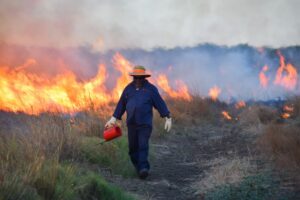
Research has been conducted in Cape York to combine contemporary methods with Indigenous burning, a happy medium. A description of the study states:
“The research shows that financial incentives, contractual obligations and modern considerations such as the protection of property often drive contemporary practices. In contrast historically Traditional Owners determined their own fire management on very fine scales for specific outcomes such as hunting, and governed it by rules that determined how people moved across the landscape and how resources were partitioned and shared. The study concludes that substantial biodiversity and social benefits could be gained by combining contemporary fire management practices with local-scale traditional fire management.”
The driving reason behind modern fire management differs significantly to traditional methods, many of which were used largely for local hunting or harvest (eg. to find yams) and not necessarily for managing fire across a landscape. The best solution is a well-informed, unbiased approach mixing modern science and Traditional methods to deliver a realistic & relevant method.
So many news articles, videos and posts have come out, criticising people for not reduction burning or suggesting Traditional methods are the answer. Many have used examples of successful reduction burns elsewhere to back their ideologies. What they don’t explain, is that so many of these videos come from the Northern Territory or Cape York. Here the country is mostly open savannah woodlands; tree density in the woodland isn’t high and it is often interspersed with grassland. Reduction burns work well here in the cooler months and can be done safely. As for late season fires, there is always the guarantee of the monsoon coming in January. The fuel loads are lower, the trees aren’t as close, and they are often on relatively flat country. The species of tree may even be different, maybe not containing as many flammable oils. As you can imagine, fires love hills & mountains, something there are plenty of in New South Wales (fire can travel uphill incredibly fast due to wind and the tip of the flame igniting what is uphill). I’m not familiar with the country where the fires are, but I imagine the topic of reduction burning in NSW is much more complex. The main point is here, regions aren’t comparable.
Australia’s Ordinary History of Prime Ministers
If you didn’t know, Australia has a history of sacking its Prime Ministers before they come to full term. In the past 13 years (since 2007) we’ve had 5 different Prime Ministers serving 6 different terms, with the shortest term being 83 days and the longest being 3 years, 3 days. Compare this to some of the more popular leaders before them (Fraser, Hawke, Keating & Howard) who served terms of 7, 8, 4 & 11 years respectively. Our mindset in this ever-disposable world is to just sack them if they screw up at any level. We don’t give them the chance to learn from their mistakes and prove they are capable of adaptation and change. There’s no support for our leaders whatsoever and Australia has become a nation of complainers – but is it warranted?
Do we ‘sack’ our partners when they burn the toast? Or do we say ‘hey, that’s not quite how you do it, but I bet that now you know how to, you’ll be much better, now have another crack’. We aren’t giving any of our Prime Ministers a chance to learn, grow and adapt. We are all human; learning and adapting is something we will never stop doing. Sure, maybe Scotty from marketing (a nickname because of his previous role in tourism) has made some questionable decisions and actions of late, but he also just released $2 billion of funding to aid in support for victims of the Australian bushfires. People will say that it’s just a band-aid and is too late, but that’s what learning is (and see below about state and federal obligations). I don’t imagine that will be the last lot of funding released. Now, I’m not for or against him, but if we oust him, can you guarantee the next person isn’t going to come in, be hated by every Aussie (as always), make the same green mistakes, just find their feet by the second year only to get ousted…and for a new Prime Minister to come in and repeat the cycle all over again.
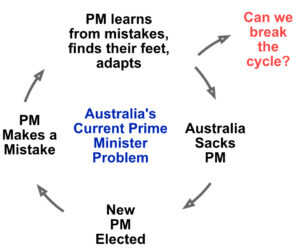
Now maybe I’m optimistic, but I doubt that any of our Prime Ministers have come into office going “oh I wanna suck at this job.” How is it, that as Australians in this modern, socially connected world, that we always hate every Prime Minister we have? Is it possible, maybe, just maybe, that the opposing party is pitting us against the current government each time? Or is it that we just hate any Prime Minister regardless? It seems to me the common denominator isn’t bad Prime Ministers. It’s the public not liking who’s in regardless, because we believe the bad news media and our own biases and perceptions on what should be done, when in reality, very few of us are trade/export experts, political experts, finance experts or fire experts…with enough experience to judge their decisions. We forget, it’s not just one man (or woman), but a whole party, advisory board and experts. It’s the whole kit and kaboodle, with one man as the face.
What is True, What is Not?
I’ve seen over the last month, people I consider to be some of the best ecologists I know, post information about fires that isn’t true (not intentionally). I’ve seen people I consider to be brilliant fire managers and firemen, post political topics that are incredibly inaccurate. Yes, it is a thing and we must accept it, and be careful of what information we perceive to be true. It is hard to discern true from fake news these days. We should leave the discussion of some of these topics to the experts. And IT IS OK to be not be an expert, and of course we can all express our opinions. But we all should consider how they may affect things if people take them for the truth.
The media is known to be biased, but the Australia bushfire crisis has seen this come to a new level. Daily we see fake news come through various media outlets and get shared and spread like wildfire. Facebook now even has fact-checking functionality in some countries. But how do you know, what you’ve seen or heard, hasn’t been created to be politically aligned? How do you know the opposition, hasn’t sparked stories against the current government, in a strategy to oust them?
It’s incredibly difficult, but we can leave our biases behind and try think pragmatically, question the plausibility of the claims, check .gov or .org websites or listen to the press releases from people directly involved, like Shane Fitzsimmons (NSW Rural Fire Service Commissioner). Does it really make sense that government hasn’t been helping at all? Do all Aussies right now think every politician has just been sippin’ coffee and smackin’ donuts in a dark room watching Friends re-runs?
Scotty, Copping the Heat
In August 2019, people in Australia were asking, “who is Scott Morrison?” Not anymore. Scott Morrison and the Australian Government have copped more heat in this crisis than a sphincter after a hot wings competition.
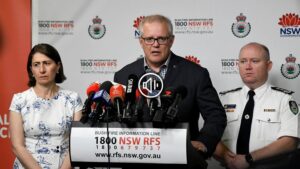
Scott Morrison and the Australian government have been slammed for taking holidays and not providing assistance or funding to the Rural Fire Service, not providing payment for fire fighters and not providing defence force assistance. They were even criticised for allowing fireworks to go ahead in Sydney on New Year’s Day. But a lot of this heat has come from poor media and our general misunderstanding of whose responsibility certain actions are.
Shane Fitzsimmons, said himself in a live press release, that the NSW Rural Fire Service is currently better funded than it has ever been. In regard to offers of help from the government and defence force, he stated, “there has been no offer of assistance that I am aware of that hasn’t been accepted.” The defence force has been working with emergency services since the 8th November, 2019. A full detail of how the defence force has been helping can be found here if you have any doubts.
Regarding the Sydney New Year fireworks, the NSW Premier, Gladys Berejiklian, said in a live press release “people travel long distances to be here. And it’s a strong message of the world and all of us, whenever you bring in the New Year, no matter what the circumstances, all of us feel a sense of hope about the future, especially as we enter into a new decade. We experience a hope about what the future might bring us that’s building positivity and optimism. I don’t see why we shouldn’t continue to do that. In fact, under these circumstances, I think it sends a strong message to our citizens and the world that we’re resilient, we’re strong. Yes, we’ve going through difficult times, but we’re always positive about our future.”
As for Scotty, just imagine being a Prime Minister. You receive death threats, your name is trashed by your ‘fellow Australians’, and you’re not able to take a holiday (that was probably booked 10 months in advance) for a mental break. Every time you genuinely care and say something publicly, it is met with scrutiny. Imagine the world of things he has to juggle, and he is essentially the face that cops everything regardless of whose screw up it was. But we never hear anyone say, “good job mate, I like what ya did there,” when something good is done. Australia, it’s time to become grateful and supportive again.
When we look at something in ‘post-mortem’, and we have all the facts and seen how it played out, it’s easy to condemn someone for a decision they made at the time when they didn’t have all the facts themselves. We forget that the bushfires have increased in severity over time. Initially, it was just another set of fires, in Australia’s bushfire season. State government representatives reacted accordingly, as did the federal government. Those fires grew, into what was to be, one of the worst fires in Australian history.
Federal v State Obligations
Now I’m not well versed in this topic, but I’ve included it for people that know less than me. In Australia, we have different levels of government: federal, state & local. It is the state government that has the responsibility for emergencies, not the federal government. In a press conference earlier this week, the NSW Premier, Gladys Berejiklian, stated, “in a state of emergency, operations decisions are taken by the commissioner. It’s not for politicians to interfere.”
Regarding the call for volunteer firefighters to be paid, apparently, this is also initially a matter for state government rather than federal governments. Scott Morrison said in a live press conference, “We’re there to help the states and territories as they address these crises. The states are the ones, as premier knows all too well, who are directly responsible for the funding of their fire services and all the other things that are done.”
Climate Change
It is very likely that climate change is a contributing factor in the increased intensity and frequency of fires in Australia. However, it is not what causes them. Lightning strikes, public negligence and accidents do. With climate change comes higher temperatures, more drought and long dry/fire seasons (for some areas of Australia). Regardless of what we choose to believe, we should consider at bare minimum, that this is a possibility.
Australia has recently been criticised for being the worst-performing country on climate change policy in a report by international climate groups. However, it doesn’t mention that USA was ranked lower than Australia in many areas and that Canada, USA, Russia, Pakistan, Saudi Arabia and Japan were also ranked terrible, whilst India and China were ranked in the higher tiers. An in depth understanding of this ranking is needed to even begin to understand how these countries compare, something I won’t delve into. It’s easy to be fearmongering, and it’s easy to be over-optimistic. Finding that middle ground in between and delivering practical solutions is the tough part. The important part.
What the Australian Bushfire Crisis Has Shown Us
In amongst all the muppets that spread false information, point fingers, and do nothing but hinder progress, this disaster has revealed thousands of HEROES: Rural Fire Services (men and women), defence force personnel, animal rescuers, wildlife carers, people offering shelter, our government and the leaders coordinating the response effort. Australia can’t thank these heroes enough, and if I’m lucky to meet any of you, I will shake your hand and say “thank you”. From the ashes, good deeds and a beautiful country has started to emerge again.
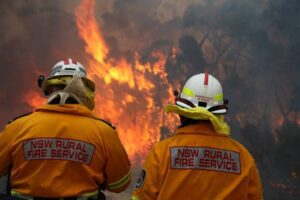
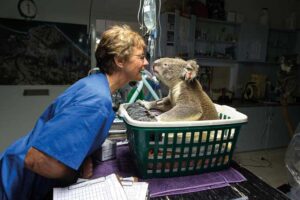
Update: thousands of people across Australia and the world have donated money and medical supplies, knitted and sewed items to help with wildlife rehabilitation. Some of the centres in NSW now have that much stock that they are overflowing, which is great news! The generosity of people has been amazing! This makes me proud to be an Australian!
Effect on the Younger Generation
As someone that has grown up feeling the pressure of trying to make the world a better place, I sympathise for the younger generations. So many young children will live through this disaster and be horrified by what has happened. I think it’s incredibly important for us as adults, to reinforce that while it was horrible, there are positives that will come out of this. The landscape will heal. We can rebuild. Animals will repopulate. But even bigger, sometimes an event of this magnitude is a catalyst for making better decisions as a nation, and personally. Share these stories with the younger ones as well!
There is an interesting article titled ‘Animal response to a bushfire is astounding. These are the tricks they use to survive’ here that you can share with younger kids to help them understand.
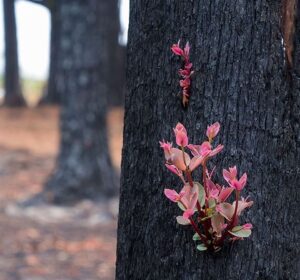
Nobody is Perfect, But We Can All Try Harder
We can all point fingers elsewhere, but idly forget that we can be do something ourselves. Even the smallest things make a difference when a nation does it together. Nobody is perfect, and nobody has to be. We need to stop condemning people for not being the perfect environmentalist or recycler, but congratulate them for starting or trying. We should encourage positive habits and focus on the good, rather than condemning people for what they aren’t doing. When people are condemned it often has the opposite effect of what is intended. This applies on so many scales. In your house. In your community. In your country.
In Australia, energy production is our largest contributor to greenhouse gas emissions. But right behind it, is transport. Rather than saying the government needs to reduce emissions, we ourselves could make sure we turn the fans and lights off in the rooms we aren’t in. We could learn how to recycle soft plastics, what is accepted in general recycling or create a compost heap or worm farm. We could carpool, ride to work or use public transport once a week. Australia, it doesn’t take one leader to make us a better nation, it takes all of us acting together, to become a better nation. What do we all tell our kids from day 1? “Baby steps.” Something we can all take away here.
So, Australia, What Do We Want?
Don’t sack the Prime Minister. Make him learn from any mistakes he has made of late, and work his holiday-loving ass off, to get Australia back on track. Right now, he should be more driven than anyone else capable of sitting in that seat. If we go to another election now, Australia will come to a stand-still, again, in a time when we need an active government. Each time we have an election, funding gets frozen, politician’s movements and actions are tightened & decision making is halted. We need to trust there is a whole government with this nation’s best interest at heart, and stop listening to the propaganda created against it.
And Scotty, PLEASE, listen to your advisors, experts and informants so your decisions are well-made and you don’t throw anyone under the bus or arrive with an army unexpected. Communicate with each other. Make us proud. Unite this amazing nation again to be a wonderful and proud country.
Fellow Australians. The next 10 years for Australia, for the rest of the world even, is going to be the most volatile and interesting period we have ever seen. We face the constant distractions of technology, the threats social media and fake news present and a climate that is scientifically proven to be changing. We can’t keep going down the path we are going down and hope our systems don’t begin to collapse. We need to support and help each other in every possible way. We could be less sceptical and not scrutinise everything. We need to be positive and believe our leaders are doing good work. We could be mindful that everything we see on the news or social media, may not be true. It’s our time to make Australia that fair dinkum, cracker of a country again. The country we all love to call home.
If you want to help but can only donate:
Some of the bigger groups include WIRES, Salvation Army and Red Cross. Some of the smaller groups, which have missed out on some of the big hype fundraisers, are equally important. If you want to donate, they have been outlined in two important lists here:
https://www.facebook.com/photo.php?fbid=2534072646870244&set=a.1443834662560720&type=3&theater
About the Author & Article
This article is a perspective piece. It has been written to share a perspective based on information and experience from someone who is not significantly emotionally fuelled or biased by these events. It has been written with no attempt to mislead or disinform, but provide a much needed alternative perspective. The author is an ecologist who has lived most of his life in Cape York and the Australian outback. He has used fire as a management tool, but his understanding of fire is only locally (Far North Queensland) relevant. His knowledge of government is limited, and offers only a perspective based on his understanding. Much of his political knowledge comes from experience with government funding and what happens to that when elections are looming. Culturally, he is well respected across several communities in Cape York and has great relationships with Traditional Owners in many communities. He is not a climate extremist, but an optimistic realist.

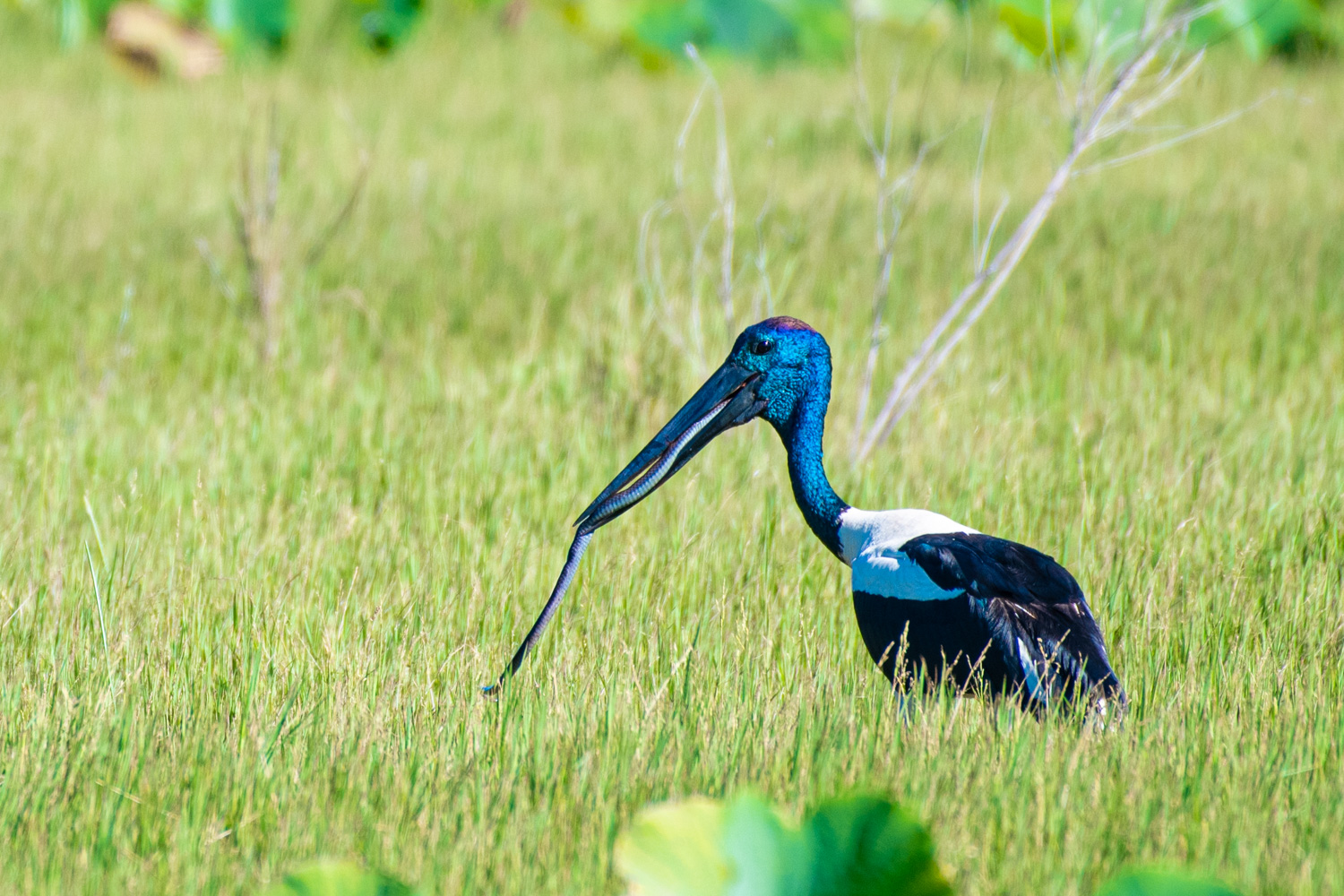
Very well thought out and delivered, yes the Prime minister went on holidays, so did two premiers, and so do a lot of aussies every year, and yes Australia was burning, but it usually burns a bit later in the season. So normally he would have been back here when the bad fires normaly get going.
Thanks heaps Russell. I’m glad you liked it. I tried to research it as best as possible and deliver it with godo intent. What you say is very true, it’s easy to point the blame in ‘post-mortem’, but hard to know how things are going to unfold in the moment. Good points. Cheers!